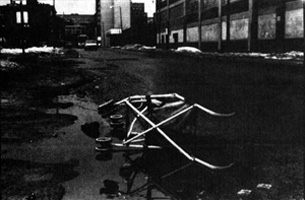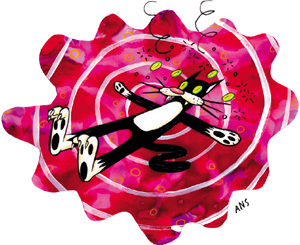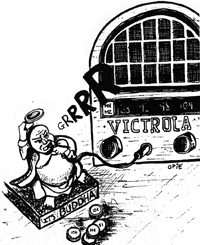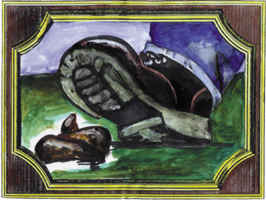 Dogshit Park
Dogshit Park
by Todd Brendan Fahey
illustrations by Rich Mackin
The old man was propped up on the sofa, listening to Van Morrison, when I came in through the back door, to “Tir-Na-Nog,” the string section of which made the flesh on my arms prickle furiously. Twice each week for the past five months, I would awaken just before 9:00 a.m., tear a long ribbon of cheap paper from the printer that had been chattering most of the night next to my bed, and run out the front door of the house I rented with two young men I’d seen less than a dozen times combined, to scale the narrow-gauge incline that crested Santa Barbara’s Riviera before dropping down nearly into the surf. If I felt I had the extra thirty seconds, I would skid into the parking lot of the Sea Cove – an outdoor restaurant with a decent abalone sandwich and a large, non-paying clientele of California gulls – slap a dollar on the counter and drive away straddling a huge iced-tea, which I somehow managed never to spill over myself.
I’ve always landed on my feet in Santa Barbara; what happens when I stay is another matter entirely. But on these sober drives to a noisy house on the beach, I had been a resident of the Gold Coast for less than two months, albeit for the third time.
The second sojourn began two years earlier, as a flight from a brutal Phoenix summer, my heart palpitations vanishing as soon as I saw the beach, then returning predictably – and with a giddy vengeance – as I awoke early one fog-bound June morning and untwisted the top from a bottle of Coors, in what would be my first in a governing stream for something like the two-thousandth straight day. I kept my promise to Marcus that I would return to Arizona as soon as the summer session at UC Santa Barbara had ended. But we both knew I’d be back.
The first was as a freshman, Marcus and I having fled together, establishing a pattern of retreat that haunts him even today, wherever he is. I’ve heard rumors of some cannery rig almost to the Aleutian Islands, where the money is so good, even he could pay off his MasterCard balance in a year of double-shifts. I have a hard time imagining those flaccid-white hands slitting endless bellies of Alaskan king salmon in the ecliptic blackness to pay off some banker in New York he’s never before met, even if he is a slave to his primitive Calvinist instincts; but penance is a fearful motivator, and I’ve never been privy to its persuasion.
John Patrick “Paddy” O’Hearn understood, in a nerveless way. “Agoraphobia,” he nodded, reaching for the CD’s remote-changer that seemed to function like unto a morphine pump: Click (changing tastes slightly to St. Dominic’s Preview): another shot into the audio lobe. “That would be the perfect environment,” he said. “Pitch-black twenty-two hours a day; sleep during the daylight hours, then back into the cannery at night. Your friend is very clever. What brought it on?” he wondered, looking more than a little like Howard Hughes before the Old Aviator fixed the lever for his final descent. He raised himself slightly on the musty sofa to peel open a tin of smoked oysters that lay on a folding card table.
I recoiled at the scent and wondered if I really wanted to get into it again. For more than four years, Marcus and I had been sparring partners in some strange shadowbox, feigning and fending, and hurting from blows both real and imagined. The last time I saw him, after I got out of a Scottsdale rehab facility, he was holed up in a condo his parents had bought for him near Phoenix: a two-bedroom, two-bath villa at Squaw Peak, with a swimming pool perched atop a grand promontory – a salve for the blistering summer, though I doubt he ever used it: He would have had to walk outside.
Paddy nodded, a thin stream of oyster-juice trickling into a grizzled, gun-metal beard. “Do you think you could bring me some coffee on Wednesday?” he asked. “About half a pound of that Irish Creme we both like. I’ll grind it myself.” Then he reached for his wallet and handed me a twenty-dollar bill. “And some clam chowder. If you remember.”
I nodded and tucked the bill into my wallet. As I stood up to leave, I handed the old man a mass of dot-matrix paper, which was still perforated at the seams. “Let me know what you think,” I said. I asked him if he wanted the curtains opened, but he seemed not to hear me, and so I left the house, the fog hanging over Santa Barbara as it always did in June, festering like a damp, dirty gauze. It was the kind of day that made me feel like drinking.
I drove into Isla Vista, to a wood-paneled sandwich shop called Grandma Gertie’s, where I had once spent a year’s-worth of Thursday evenings challenging a drunk driving violation. When I finally went into rehab a couple years later, I was proud to say that I had beaten a House where, at ninety-nine cents a pitcher – when a man spends ten bucks, stays for three hours, and doesn’t eat – the odds are not long in his favor.
I was drinking nothing stronger than Pepsi this time around, whiling away a gloomy afternoon just staring into a television perched high on a shelf in one corner of the shop, at the finely-oiled hitting machine that appeared to be Hector Camacho beating away on a hapless Bobby Chacon when a black man limped into the shop. The owner instantly, almost viscerally, made move for the low, swinging door behind the counter.”
Getouttahere, Preston!” he spluttered.
Preston backed up a few steps and tipped his knit beret. “Mon, iss okay. I’s jess comin’ to see m’ friend.” The Jamaican turned and eyed me, lowering his head in a short nod.
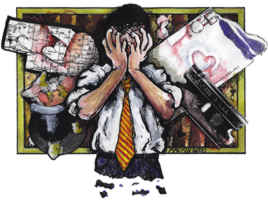 I had met Preston in adjacent Dogshit Park several years earlier, after the drugs had run dry in the dorms, and the brave and desperate were forced to take a Walk on the Wild Side, as it were. For his troubles, I remember giving him a $5 “finder’s fee,” and walked back to Francisco Torres dormitory with a small bag of magic mushrooms. Preston and I had asked very few questions of each other that day, and still I felt I had everything about him I needed to know.
I had met Preston in adjacent Dogshit Park several years earlier, after the drugs had run dry in the dorms, and the brave and desperate were forced to take a Walk on the Wild Side, as it were. For his troubles, I remember giving him a $5 “finder’s fee,” and walked back to Francisco Torres dormitory with a small bag of magic mushrooms. Preston and I had asked very few questions of each other that day, and still I felt I had everything about him I needed to know.
Eight years later, I would find Preston leading me out onto the same sidewalk, on the fray of Dogshit Park, talking that same low, Caribbean rumble. “Johnny, he walkin’; he takin’ it slow, back over dehr,” he said, motioning over his shoulder.
I slid a hand into my front pocket and scrunched up a five-dollar gratuity, casually flicking it into the dirt as I walked away, which I’m sure Preston just as casually reached down and palmed as soon as I had made sufficient distance. After fifteen years on the streets, with only a recent few incarcerations for public drunkenness, his liver slowly giving out with age, Preston had become as discrete as a country doctor with a taste for smack. At forty-three, he lived by sweeping out shops, returning scrounged bottles, a little peddling here and there for to gain him the odd dollar from respected alumni, such as myself. His only fear was the soulless prep, who would give him up in a hot second to keep from getting buggered in the County Jail. Unfortunately for Preston, such an incidence of betrayal incarnate had come in the form of the only scion of the Grandma Gertie’s empire – a lacrosse player one year my junior, and whose name I recall as Mickey. Mickey’s father (the man behind the counter) – a proud and scrupulous man of Greek Orthodox extraction – refused to put up bail for his prodigal son, whose jail experiences, I am told, led him to the Lord in the form of a Pentecostal ministry.
I could walk through Dogshit Park in 80 years and still see the same faces: clustered around a bench on the northeast corner, four or five Navajo Indians hold a debased pow-wow, passing amongst themselves a bottle of Pisco and a pack of filterless Camels, a tubercular tribute to a young, smirking Sun God in the marketing division of Phillip Morris; a group of toothless old darkies sit huddled near a garbage can next to the swing-set, shuckin’ that slow shuck, all orange-livered eyes, wetnursing a jones for Jim Beam; the skaters, the hackey-sackers, the prowlers.
Johnny was, by my estimation, a Casualty, though a functional one. He walked everywhere, and everywhere he walked, a bright, pleasant grin stretched his facial musculature, and he looked like a carpenter who had plied his trade well. His faded jeans and T-shirts always somehow freshly laundered, his sun-yellowed hair combed forward in a Caesar cut, the only blemish on his person the weather-chapped lips which spoke calmly, peacefully. A Casualty.
I wish to this day that I had been able to ask Johnny to lunch, but the trust was hard-won and, to my mind, random and accidental, like a hunter of yage coming upon some young, abandoned puma, whom the beast recognizes as being as scared as she. So when I passed Johnny on the streets of Isla Vista, it was always the same scene: a vague, slowly-remembering dawn of recognition, followed by a thoughtful pause. Then we would walk toward the storage shed he kept in such a strip along a side alley near Dogshit Park. A quick whisk of the combination lock, door opens, Johnny pops in and out, while I stand, heart palpitating, spared but for the grace of God by the fast-rushing surveillance team that reportedly had been closing in on him in recent weeks, just a click of the cuffs, the world as one knows it savagely altered.
Once, a few years earlier, I had felt such heat prickle the back of my neck, and probably I should’ve been taken off the road anyway… just another Thursday night at Grandma Gertie’s. But somehow I had one-eyed it toward the beach and gotten as far as the Tony Riviera before losing my bearings in a decrepit Ford Fiesta rag-top convertible. The fear of God becomes real in times like these: palpable – a cleansing sort of fear that makes one promise outrageous lies; a nerve tonic coming on like a veritable Beacon of Light, rinsing the pitchers from the dross; a grounding magnet to lead the rag-top Ford Fiesta slowly, carefully away from the marked patrolcar following so intolerably close behind, those sixty hits of Woodstock acid in the wallet suddenly feeling rather superfluous.
When I had entered the fringes of a less-affluent neighborhood, the patrol car hit its lights once and veered off onto a side street. And as soon as I hit the neon pulse of State Street, I parked at the Bank of America monstrous parking structure and took in a clammy, late-night movie, and prayed.
But I had no such fear this night; I was sober like a Baptist at Easter and took the freeway straight home. When I returned after midnight, the wood-shingled house I rented near the beach was almost dark, only a soft-orange glow from a Chinese lantern in an upstairs window to tell me that Scott was still up. And I knew we would talk this night, because we had not yet, and things would explode if we didn’t.
I’d been living in the house for nearly three months, and my bizarre hours kept the roommates guessing. As Scott was sole signatory on the lease, and as I paid rent to Scott, all questions as to the democracy of the household had been erased during the pre-screening phone interview. A subsequent personal interview revealed the young lessor (in my cheapest armchair analysis) as a harried draftsman by day, a brilliant, frustrated, inconfident artist by night, the middle child of alcoholic parents since divorced, at just over five-foot five, suffering Little-Man’s syndrome, a compulsive cleaner who, though aware of his compulsion, recognized it as merely the tip of a larger, more formidable neuroses to which he felt powerless and resigned. In short: a perfect candidate for some of the blotter acid I had been allowed by the kind Fates to escape with late that afternoon.
I took a seat at my computer in the downstairs bedroom, tapping out one of my unnatural stories for Paddy, Peter Gabriel-era Genesis hissing perpetually through the speakers, until I heard the sound of the microwave. Then I unlocked the door and readied myself for a certain psychic hell that thankfully never came. Instead, Scott shrugged and turned his palms toward the ceiling, smiling in some resigned way.
“What’s going on?” he grinned, not looking past me and into my painfully lighted room with the faux-vaulted ceiling, not looking overly concerned with what it was I was doing at nearly two in the morning, not even looking much like the same fussy landlord with whom I had withstood such a grueling interview weeks earlier… just a man in his early prime wanting to know what lay at the heart of such a strange goddamned animal as was living in the bedroom underneath him.
I exchanged politenesses, grabbed one of the mugs of herbal tea from his fist, and motioned toward the weatherbeaten orange-and-rustcolored sleeper-sofa that sat in my bedroom, and on which I had slept lately, when I slept at all.
“So what do you want to know?” I wondered, sipping the tea.
“I guess you’ve found a job by now,” he said, groping. “None of your checks have bounced.” He stared silently into his cup.
“Do you have plans for the next eight or nine hours?” I said suddenly, feeling that if I weren’t going to eat some of this acid, I would have to go immediately to sleep.
He raised an eyebrow. “I dunno…” Those eyes continued to watch in stunned fascination as I emptied my wallet of several thin strips of brightly-stamped paper. “No wonder you’re up all the time,” he muttered.
“I’m going to eat two of these,” I told him, “and you’re welcome to join me. I think we’ll have a good time. But you’ll have to eat them if you want to stay.”
He nodded blankly, then recovered to inspect the pattern on the paper, which appeared to be the feet of a Goony Bird… though I would’ve needed the rest of the sheet to really be sure. “Jesus, where’d you get so much of it?”
“Isla Vista,” I shrugged. After I had told him about Johnny, I handed him two squares. “Here. Just put it in your lower lip, like Copenhagen, forget it’s even there. In about forty-five minutes, you’ll feel like you need to laugh. Then you won’t be able to help it. Neither of us will.”
He did as instructed, his tongue fiddling along the buccal membrane every so often as we talked about his dead-end draftsman’s job with a local interior design firm, and how he would never see a promotion for lack of a college degree, of which he found himself shy by at least eighty units.
“That’s a tough spot,” I admitted, searching myself for the drug’s first telltale clues, but finding none.
“So I keep thinking about my art,” he said. “You probably haven’t seen any of it yet.”
I shook my head, suddenly feeling a strange new relationship with this wood-shingled house near the beach, and especially with its long-term resident. “I’d like to, though. I really would. I love art.”
He nodded, settling down into the cushions of the sofa, and I could see it as some kind of physical manifestation of the acid, a hunkering down before the hurricane.
“Is this music okay?” I wondered, trying to make his journey on the Lysergic Express a pleasant one.
“It’s really twisted,” he said, and he seemed to be genuinely involved in the way Peter Gabriel had coiled himself around my speakers, like the original King Cobra. He leaned forward and picked up the dust-jacket of Selling England by the Pound. “God, these guys were pioneers,” he said, and it was then that I knew he had been bitten. “They make Led Zeppelin sound like a bunch of horny boys.” He began slicking a thin lock of blond hair back over his forehead, which revealed a marked destiny toward male-pattern baldness. Then he sucked in his breath.
“You want to take a walk?” I asked him.
“Uhhm…” and he was forced to think about this one, “maybe soon. I think I should see where this goes.”
The phone rang in my room, and we both looked at it like a diseased thing.
To be continued…
Todd Brendan Fahey is author of Wisdom’s Maw: The Acid Novel [www.fargonebooks.com]

